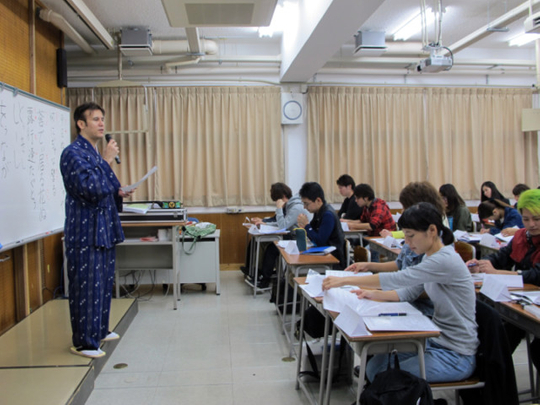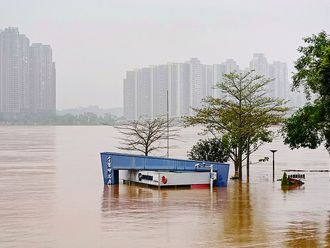
Standing up one by one at their wooden desks, the students giggled, squirmed or shuffled as they introduced themselves, some practically in a whisper.
“Waa naamee ya . . . yaibiin,” the Okinawa Christian University students managed to get out their names, a few confidently, but most of them sheepishly.
Their teacher, Byron Fija, was waving his arms around, laughing and trying to encourage the students — who bore the hallmarks of students everywhere, with hoodies and baseball caps and the requisite guy with green hair — to own it.
But it was clear that this language didn’t come naturally to most of them.
The language? Okinawan, the biggest of the six main indigenous languages spoken in this subtropical Japanese island chain, which was once the independent Ryukyu kingdom, but is now best known for being home to most of the American military bases in Japan.
Okinawa was annexed by Japan in 1879 then occupied by the US for almost 30 years after the Second World War, and Okinawans still say they feel that Japan treats them like second-class citizens. That the noisy, invasive American bases are concentrated on their islands is evidence of this, they say.
And the way their languages have been suppressed, almost to the point of extinction, is exhibit No. 2.
No one knows how many native speakers of each of the six Ryukyu languages remain — estimates range from a few handfuls for those spoken in outlying islands to a few hundred for Okinawan. They are mutually unintelligible between themselves, let alone with Japanese.
Unesco categorises each of the six Ryukyu languages as either “definitely” or “severely” endangered, meaning children no longer learn the language as a “mother tongue” in the home or that it is spoken only by grandparents and older generations.
The agency estimates that, if nothing is done, half of 6,000-plus languages spoken today will disappear by the end of this century, taking “cultural wealth but also important ancestral knowledge” with them.
But this would be reversible, Unesco says, if there were policies to maintain or revitalise mother tongues and pass them on to younger generations.
“I’m from here. Of course I should learn the language,” said Kai Irei, one of the students learning elementary Okinawan from Fija (and answering a reporter’s questions in English). “If I don’t speak Okinawan, I can’t say I’m from Okinawa.”
Fija is almost evangelical in his promotion of Okinawan, poetically called “uchi-naa-guchi” here.
Wearing a traditional Japanese outfit but with an Okinawan pattern, he plays the sanshin, a three-stringed Okinawan banjo, sings and teaches. For five years he hosted a radio show in Okinawan.
For him, the language is intrinsic to his identity. Now 45, he is a product of the military occupation: His mother is Okinawan and his father American, never heard from again.
Two things made Fija embrace the local language and culture.
First: He started playing the sanshin.
“Someone told me that my playing was fine, but my Okinawan sounded American, even though I don’t speak any English. Maybe it was because I don’t look Japanese or Okinawan,” Fija said after class, adding that his Okinawan pronunciation was the equivalent of a Japanese person singing “I rub you” instead of “I love you” in English.
Second: In the 1990s, he spent a year or so in Los Angeles, hoping to make it as a rock star. But he realised how hard that was — and had an epiphany. Before he had never really been accepted as Japanese because of his Caucasian looks, but with no knowledge of his father and little English ability, he clearly wasn’t American either.
In the United States, he found his identity. He was Okinawan.
Here, the language is imbued with politics.
Ask any proponent of the Ryukyu languages in Okinawa the most basic question, and you will immediately hear spiel about why they are languages in their own right, and not dialects of Japanese. Advocates see efforts to classify them as dialects as further evidence of oppression.
Romance languages like Spanish, French and Italian share about 80 per cent of their vocabulary, linguists say. But Japanese and the Ryukyu languages, while in the same “Japonic” family, have only 60 per cent of their words in common, making the gap between them greater than that between English and German.
“Ever since Japanese annexation of Okinawa, our languages were considered to be second class, not to be spoken in public,” said Shinsho Miyara, professor emeritus of linguistics at the University of the Ryukyus. He helped found a nonprofit group and became chairman of the Ryukyu Heritage Language Society, trying to promote the language.
So far, their efforts haven’t amounted to much, partly because even the Okinawan prefectural government isn’t really on board.
There’s a “welcome” sign in Okinawan at the islands’ main airport, but it’s spelt wrong: “mensoore” instead of “mensooree.” The islands now have one day a year — September 18 — designated to promote the local languages, but nothing much happens on the other 364 days.
Miyara said it is crucially important to try to save the languages. “We need this to rebuild our identity and our confidence and to promote our culture,” he said. He points out that local schools teach Japanese language and history, but not Okinawan.
“It’s as if we were blindfolded in 1879 when Okinawa became part of Japan,” Miyara said. “We need to remove the blindfolds. Language can be the basic foundation for our future.”
Patrick Heinrich, a Ryukyu language specialist now teaching in Italy, says that he’s “slightly optimistic, but not that optimistic,” that Okinawan can be saved. However, he’s not hopeful about the other five local languages.
“Of course, endangered languages need government support, but it’s not sufficient to teach them at school,” Heinrich said. “Ultimately, people have to start to use these languages again in situations where it’s natural to use them. But to get people to really speak again, that’s not so easy.”
But Shigehisa Karimata, a linguistics professor at the University of the Ryukyus, says that the indigenous tongues are dialects, not languages in their own right, and that the one-time kingdom is now part of Japan, so its language should be considered a subsidiary of Japanese.
“This abstract idea of an ‘Okinawa identity’ doesn’t really exist,” he said, contending that Okinawa is a collection of diverse cultures. “It’s the same way as not all Japanese is the same. It depends on where you are from.”
But the young people in Fija’s class don’t agree.
“If we, the young generation, lose interest in this language and culture,” said Samuel Kinjo, a 20-year-old from Naha, “then it will become just another part of a great big country called Japan.”
–Washington Post
Sidebar
Encouraging Okinawan could also have economic benefits. Tourism is one of Okinawa’s main industries and promoting local products, using local languages, would boost their attraction, analysts say.
All around the main island, restaurants play up the local cuisine, which includes a bitter gourd called “goya” and a bright purple sweet potato that’s turned into everything from butter to ice cream. (And there is spam in seemingly every dish, another legacy of the American occupation.)












